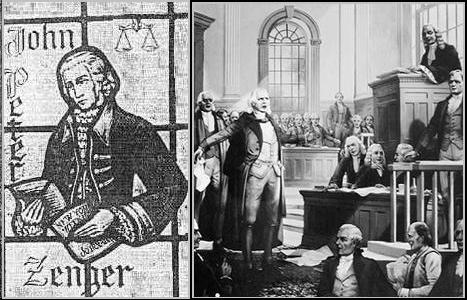
John Peter Zenger was only thirteen when his family made the harsh journey to America in 1710. His father died enroute and John was signed as an indentured apprentice to New York’s only printer, William Bradford, with whom he entered into a partnership with in 1725. Zenger, a modest printer of mainly religious tracts, was approached by lawyer Andrew Hamilton and Bradford to start a weekly newspaper to be called the New York Weekly Journal with the intent to expose New York Governor William Cosby as an incompetent and corrupt fraud.
When Zenger published the first issue on November 5, 1733, the Weekly Journal printed a detailed account of the previous week’s election of a Popular Party candidate for assemblyman despite Cosby’s duplicitous efforts to rig the election. Subsequent issues of the Journal further editorialized about the Governor’s unpopular activities and actions.
After two months, Cosby decided to have the paper silenced, first by charges of seditious libel, then on accusations of libel. However, neither attempts were successful. In one issue, Hamilton’s said: “The loss of liberty in general would soon follow the suppression of the liberty of the press; for it is an essential branch of liberty, so perhaps it is the best preservative of the whole. Even a restraint of the press would have a fatal influence. No nation ancient or modern has ever lost the liberty of freely speaking, writing or publishing their sentiments, but forthwith lost their liberty in general and became slaves.” Cosby responded by ordering “the common hangman” to burn Zenger’s papers. Finally his Justices issued a bench warrant for Zenger’s arrest and on November 17, 1734, Zenger was arrested and jailed under brutal conditions for eight months.
The unreasonably huge bail set for Zenger combined with his many “letters” from prison resulted in an outpouring of public sympathy for his cause. Added this to the fact, while her husband was in jail, Zenger’s wife Anna, although busy with their six young children, managed to keep the New York Weekly Journal publishing, missing only one issue, building broad public support for Zenger’s cause.
On August 5, 1735, eloquent Andrew Hamilton had to convince twelve New York jurors to ignore the instructions of Governor Cosby’s hand-picked judges and returned a verdict of “Not Guilty” on the charge of publishing “seditious libels.” Hamilton himself undertook Zenger’s defense because the first two lawyers attempting the task were suddenly disbarred by the crooked Chief Justice Delancey.

The question before the Court and you, Gentlemen of the jury, is not of small or private concern. It is not the cause of one poor printer, nor of New York alone, which you are now trying. No! It may in its consequence affect every free man that lives under a British government on the main of America. It is the best cause. It is the cause of liberty. And I make no doubt but your upright conduct this day will not only entitle you to the love and esteem of your fellow citizens, but every man who prefers freedom to a life of slavery will bless and honor you as men who have baffled the attempt of tyranny, and by an impartial and uncorrupt verdict have laid a noble foundation for securing to ourselves, our posterity, and our neighbors, that to which nature and the laws of our country have given us a right to liberty of both exposing and opposing arbitrary power (in these parts of the world at least) by speaking and writing truth.
The jury deliberated for a short time before returning with a “Not guilty.” Shouts of joy rang from the crowd of spectators. Delancey unsuccessfully demanded order, even threatening spectators with arrest and imprisonment, but he hastily left the courtroom to the cheering crowd.
Although the Zenger trial did not establish new law with respect to seditious libel, it gave birth to a free and open press in America and within a half-century members of the First Congress debated the proposed Bill of Rights.